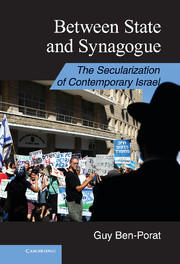6 - Live and Let Buy
Bargaining for the Sabbath
Published online by Cambridge University Press: 05 January 2013
Summary
The declaration of the Sabbath as the official day of rest was one of the tenets of the status quo and, for many Israelis, also a principal expression of a Jewish state (Shaki, 2005). The proliferation of commerce on the Sabbath (Shabbat, in Hebrew) is a marked indication of the erosion of the status quo and the growing rift between religious and nonreligious Israelis, who hold different interpretations of the Sabbath and different expectations regarding its public status. For religious people, the Sabbath is a day dedicated to prayer and family life, when commercial activity is strictly prohibited. The religious position refuses to separate the perception of a day of rest from that of a holy day:
The Shabbat is supposed to be a holy day for those who observe it; the holiest day in the Hebrew calendar; a day whose religious-spiritual substance elevates the Shabbat time to a supreme level of sanctity and an uplifting of spirit and soul. It also raises the person keeping the Shabbat to the uppermost spheres of faith, spirit, philosophy and emotion, both religious and national. All these elements make the Shabbat a day of supreme spiritual pleasure, which is devoted, or which should be dedicated mostly to studying Torah [Jewish law]. Let it be clarified further that these are not symbolic matters and the Shabbat was not meant to stand for symbolism.
(Shaki, 1995)For the nonreligious public, strongly influenced by consumer culture, the Sabbath has come to mean something entirely different, a day of rest and leisure, as the large crowds that visit shopping centers and restaurants on the Sabbath indicate. The use of the term nonreligious rather than secular is purposeful, as many of those who shop on the Sabbath would not identify themselves as secular and their other practices and values may not demonstrate secularism. The expansion of commerce on Sabbath can be explained as a direct outcome of the emergence of a consumer society in which shopping is not just for satisfying basic needs, but is a cultural-leisure decision. This change can be described as a shift from “consumption,” a mostly private and essential activity, to “consumerism,” a social activity defining society's character, which becomes a central part of one's daily life (Bauman, 2007: 26).
- Type
- Chapter
- Information
- Between State and SynagogueThe Secularization of Contemporary Israel, pp. 176 - 212Publisher: Cambridge University PressPrint publication year: 2013

